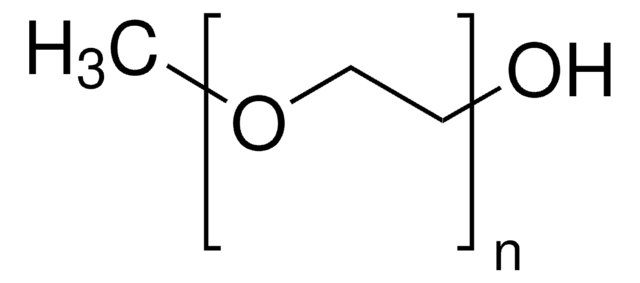모든 사진(1)
About This Item
Linear Formula:
H(OCH2CH2)nOH
CAS Number:
MDL number:
UNSPSC 코드:
12352104
PubChem Substance ID:
NACRES:
NA.23
추천 제품
양식
flakes
Quality Level
분자량
average Mn 20,000
mp
63-66 °C
Ω-끝
hydroxyl
α-끝
hydroxyl
SMILES string
C(CO)O
InChI
1S/C2H6O2/c3-1-2-4/h3-4H,1-2H2
InChI key
LYCAIKOWRPUZTN-UHFFFAOYSA-N
유사한 제품을 찾으십니까? 방문 제품 비교 안내
일반 설명
Polyethylene glycol (PEG) is a hydrophilic polymer. It can be easily synthesized by the anionic ring opening polymerization of ethylene oxide, into a range molecular weights and variety of end groups. When crosslinked into networks PEG can have high water content, forming “hydrogels”. Hydrogel formation can be initiated by either crosslinking PEG by ionizing radiation or by covalent crosslinking of PEG macromers with reactive chain ends. PEG is a suitable material for biological applications because it does not trigger an immune response.
애플리케이션
PEG has been used to modify therapeutic proteins and peptides to increase their solubility and lower their toxicity.
Photopolymerized PEG hydrogels have emerging applications in the fabrication of bioactive and immunoisolating barriers for encapsulation of cells.
Photopolymerized PEG hydrogels have emerging applications in the fabrication of bioactive and immunoisolating barriers for encapsulation of cells.
기타 정보
Molecular weight: Mn 16,000-24,000
Storage Class Code
11 - Combustible Solids
WGK
WGK 1
Flash Point (°F)
Not applicable
Flash Point (°C)
Not applicable
개인 보호 장비
Eyeshields, Gloves, type N95 (US)
이미 열람한 고객
Xu Zhang et al.
Langmuir : the ACS journal of surfaces and colloids, 28(40), 14330-14337 (2012-09-20)
Understanding the interface between DNA and nanomaterials is crucial for rational design and optimization of biosensors and drug delivery systems. For detection and delivery into cells, where high concentrations of cellular proteins are present, another layer of complexity is added.
Chien-Chi Lin et al.
Biomaterials, 32(36), 9685-9695 (2011-09-20)
Hydrogels provide three-dimensional frameworks with tissue-like elasticity and high permeability for culturing therapeutically relevant cells or tissues. While recent research efforts have created diverse macromer chemistry to form hydrogels, the mechanisms of hydrogel polymerization for in situ cell encapsulation remain
Carrie F Olson-Manning
Molecular biology and evolution, 37(8), 2257-2267 (2020-03-21)
Metabolic networks are complex cellular systems dependent on the interactions among, and regulation of, the enzymes in the network. Although there is great diversity of types of enzymes that make up metabolic networks, the models meant to understand the possible
Teagan E Bate et al.
Soft matter, 15(25), 5006-5016 (2019-06-06)
Self-organization of kinesin-driven, microtubule-based 3D active fluids relies on the collective dynamics of single microtubules. However, the connection between macroscopic fluid flows and microscopic motion of microtubules remains unclear. In this work, the motion of single microtubules was characterized by
Idalis Villanueva et al.
Acta biomaterialia, 5(8), 2832-2846 (2009-06-11)
The pericellular matrix (PCM) surrounding chondrocytes is thought to play an important role in transmitting biochemical and biomechanical signals to the cells, which regulates many cellular functions including tissue homeostasis. To better understand chondrocytes interactions with their PCM, three-dimensional poly(ethylene
문서
Devising biomaterial scaffolds that are capable of recapitulating critical aspects of the complex extracellular nature of living tissues in a threedimensional (3D) fashion is a challenging requirement in the field of tissue engineering and regenerative medicine.
자사의 과학자팀은 생명 과학, 재료 과학, 화학 합성, 크로마토그래피, 분석 및 기타 많은 영역을 포함한 모든 과학 분야에 경험이 있습니다..
고객지원팀으로 연락바랍니다.

